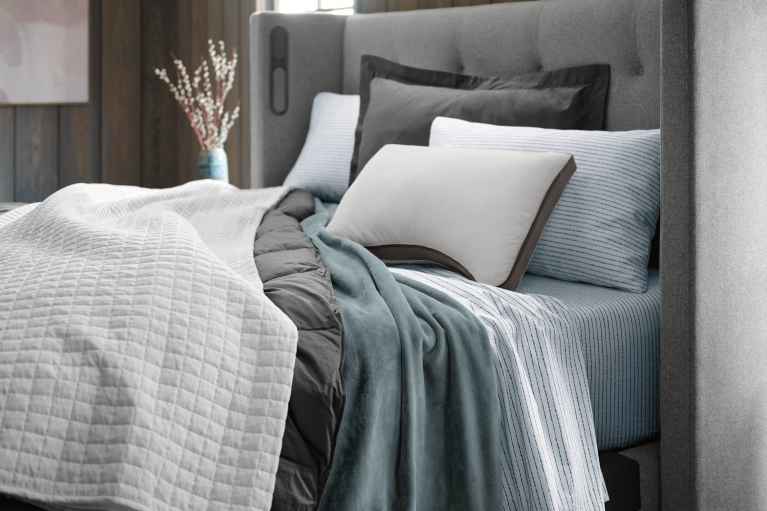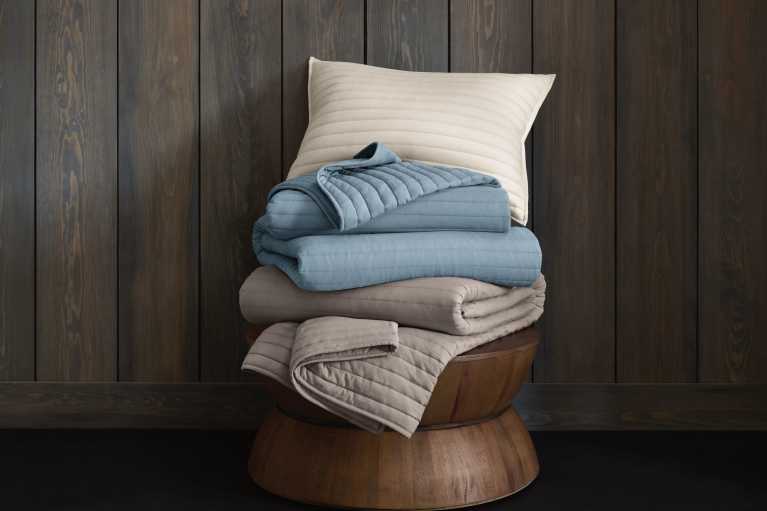
The right bedding makes all the difference when it comes to your individual comfort and style. Find out whether a quilt or a comforter is best for you.
What is a quilt?
A quilt is a bed covering that’s both warm and decorative. This bed cover is made of two layers of fabric stitched, or quilted, together with insulative batting in between. Traditional patchwork quilts feature small pieces of fabric sewn together to form a larger pattern. Today’s quilts are often machine sewn from two large outer pieces of fabric. They’re available in classic to modern designs and a variety of solids, prints and colors. Many quilts are reversible, with a pattern on one side and a single, solid color on the other.
What is a comforter?
A comforter is a top-of-bed layering piece designed to keep you warm and cozy. Like quilts, comforters are made of two layers of fabric sewn around a fill, often stitched together in a grid pattern to keep fill from shifting. Unlike quilts, comforters usually contain lofty down or down alternative, so they’re fluffier. Available in lightweight to extra warm, comforters can provide just-right warmth for all seasons. Comforters come in many colors, prints and textures to complete the look of your bed and coordinate with any bedroom décor.
What’s the difference: comforter vs. duvet
Quilt and comforter differences
Not sure which is right for you? Let’s get into the specifics of quilts vs. comforters so you can make the best choice.
|
Quilt |
Comforter |
|
|
Warmth |
Moderate |
Light to Extra Warm |
|
Fill |
Available in cotton to polyester to wool |
Usually filled with down or down alternative |
|
Weight |
Medium weight |
Lightweight |
|
Allergens |
To avoid allergens, choose non-allergenic fill and wash regularly |
To avoid allergens, choose non-allergenic fill and wash regularly |
|
Cleaning |
Hand wash or machine wash gentle cycle, air dry |
Use a front-loading large capacity washer and dryer |
|
Size |
Standard bed sizes and more |
Standard bed sizes and more |
Warmth
Quilts offer moderate warmth when filled with cotton or polyester, and additional warmth with wool fill, a natural insulator. Quilts are a great winter option for people who sleep too hot.
If you live in a cold climate, a comforter will keep you cozy. Comforters are generally warmer than quilts because they’re filled with down or down alternative, which traps warm air close to your body. For milder weather, a light-warmth comforter works well.
Fill
Quilts can be made with different types of fill, or batting, but the most common are polyester and cotton. Polyester batting is thicker and heavier, whereas cotton is thinner and more breathable.
The most popular comforter fills are down and down alternative. Down is a soft, lofty fiber sourced from the undercoat of ducks and geese and has amazing warming capabilities. Down alternative is a non-allergenic, synthetic fill made of polyester microfiber that mimics the softness and loft of down.
Weight
Comforters and quilts offer different levels of warmth, but how heavy do they feel?
Most quilts provide moderate warmth but can feel heavier than a comforter because of thicker fabric and denser fill.
Comforters are designed to provide warmth without feeling heavy. They feature lightweight fabric with fluffy down or down alternative clusters inside, so even extra warm comforters can feel light and airy.
Allergens
Synthetic materials found in polyester-filled quilts and down alternative comforters are less likely to trap allergens than other fills. They’re ideal for people with allergies to things like dust and pet dander and for those who are sensitive to down. Washing your bedding regularly is another effective way to minimize allergens.
Cleaning
Hand washing is the best way to clean small and more delicate quilts. Quilts can also be machine washed in cold water on delicate cycle. It’s best to air-dry quilts, but they can be put in the dryer on the lowest heat setting and removed while still damp.
Comforters can be machine washed on gentle cycle in cold water with mild detergent and tumble dried on low heat with dryer balls, turning frequently to prevent scorching. A front-loading washer and dryer are recommended.
Size
You’ll find both quilts and comforters in a variety of sizes for just the right fit. Quilts are available in standard bed sizes from Twin to King. Looking for a specialty size? Crib, toddler, youth and throw quilts are options.
Comforters are also available in Twin to King, plus special sizes like crib and throws. If you’d like specific sizes and shapes, you can find custom-made comforters and quilts from small to extra large, square to round or anything in between.
So which is right for you?
